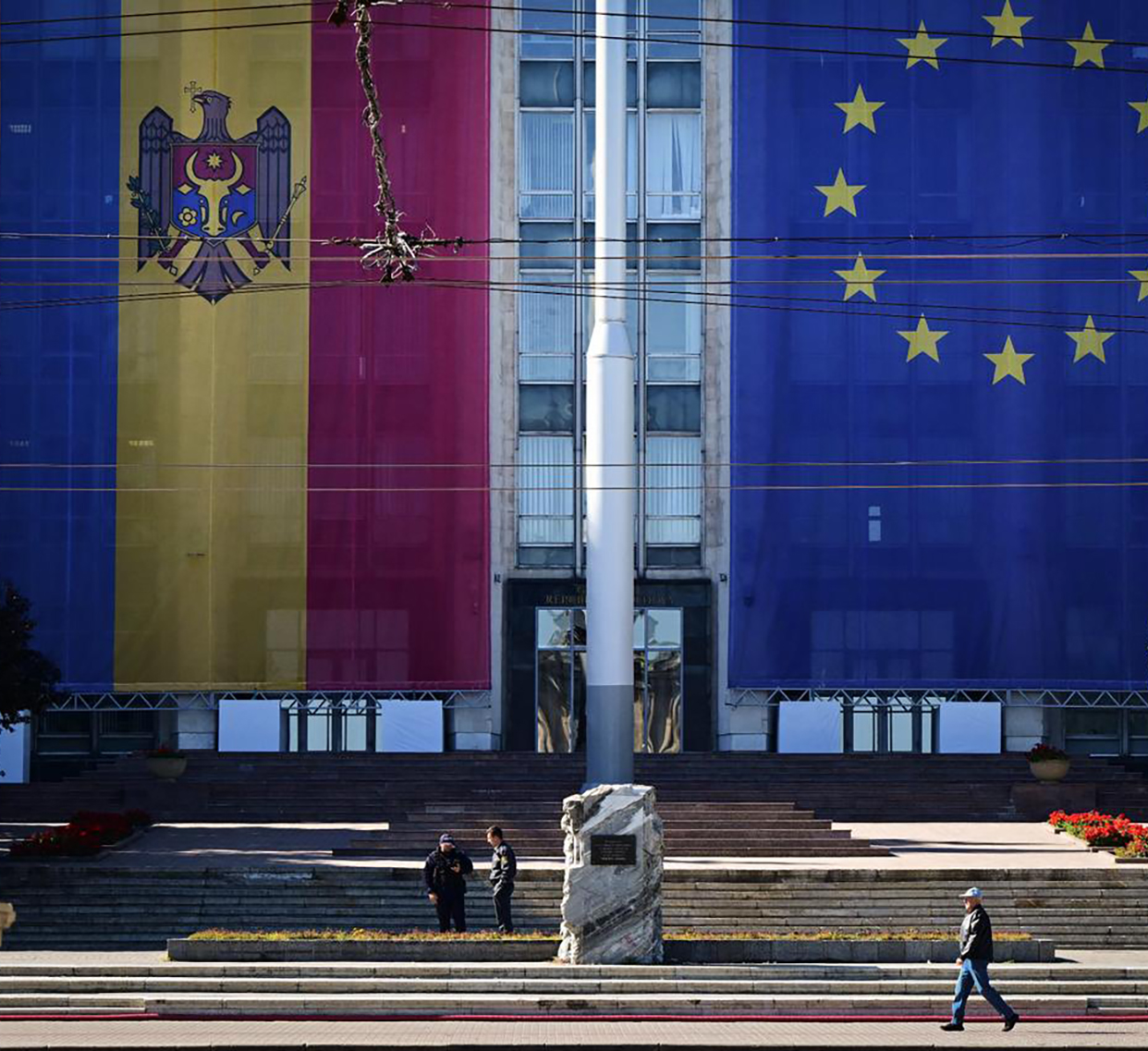- In Serbia, organizers of paramilitary camps for Moldovans arrested
On September 26 in Serbia, two persons were arrested, accused of organizing paramilitary training for citizens of Moldova and Romania.
During a search of the suspects’ apartment, the police seized laptops, mobile phones, as well as a device for detecting and monitoring radio frequency signals. One of the suspects was also found in possession of weapons, for which he is additionally charged with a criminal offense – illegal production, storage, carrying, and trafficking of weapons and explosive substances.
Investigative journalists reported that the persons in question are Lazar Popović and Savo Stevanović. The media discovered that the arrested individuals were at one time members of the team of Nenad Popović, the current minister without portfolio in the Government of Serbia, known for his pro-Russian stance.
In total, it is reported that between 150 and 170 foreign citizens underwent training in paramilitary camps in the Loznica area in western Serbia from July to September this year. The training was intended to teach the “cadets” to provoke unrest in the event of unfavorable results for pro-Russian forces in the Moldovan parliamentary elections (September 28).
However, the large-scale hybrid operation was stopped: in Moldova the plans of pro-Russian forces were uncovered in time, and several days ago 74 persons were detained on suspicion of preparing unrest.
Against the backdrop of events preceding the vote in the Moldovan elections, the EU deployed its first hybrid rapid reaction group to assist Chișinău. Commissioner for Enlargement Marta Kos told journalists that the European Commission is aware of attempts by Russia to influence the parliamentary elections in Moldova and is examining “how it became possible” that dozens of Moldovans reportedly underwent training “in destabilization tactics” in Serbia.
Meanwhile, in the September 28 elections, victory was won by the ruling pro-European “Party of Action and Solidarity” (Partidul Acțiune și Solidaritate, PAS), whose leader is President Maia Sandu. According to preliminary data, PAS won 50.2% of the vote and will secure a majority in the new parliament.
- Dodik’s party to participate in early elections for the President of Republika Srpska
The Alliance of Independent Social Democrats (SNSD), the party of Milorad Dodik, on September 29 decided to take part in the early elections for the President of Republika Srpska.
The elections will be held on November 23. They were announced after the Central Election Commission, on the basis of a court decision, terminated Dodik’s presidential mandate in August this year.
Dodik was convicted by the Court of Bosnia and Herzegovina for failure to implement the decisions of the High Representative in Bosnia and Herzegovina and was specifically prohibited from holding public office for six years.
Earlier, Dodik himself, his party SNSD, and the National Assembly of Republika Srpska (NSRS) did not recognize the court ruling of BiH on the termination of Dodik’s presidential mandate and the CEC decision to announce early elections. However, later NSRS adopted a decision granting “each party the right to independently decide whether to participate in the elections”.
At the same time, Dodik officially resigned from the position of president, thereby recognizing the decision of the Court of Bosnia and Herzegovina and the Central Election Commission of BiH. Now, according to him, “SNSD must as quickly as possible propose in the National Assembly of Republika Srpska a solution for the election of an acting president of RS until the early elections, and possibly longer,” said Dodik.
The reason for SNSD’s participation in the elections was the refusal of opposition forces in Republika Srpska to boycott the announced early presidential elections and the lack of consensus on this issue within Dodik’s own party. As the media report, at the meeting of the SNSD Main Board, allegedly “no agreement was reached regarding the boycott of the elections,” therefore it was decided that the party will participate.
“This is part of our strategy, which we decided to implement, in order to oppose what was going to threaten Republika Srpska,” Dodik commented on SNSD’s decision to participate in the elections.
- The US will postpone sanctions against NIS for only a few days
President of Serbia Aleksandar Vučić, in his address from New York, announced that the United States has once again postponed sanctions against NIS (Naftna Industrija Srbije), but only for a few days. The restrictive measures had been expected to take effect on October 1. However, later Radio Television of Serbia reported that the sanctions had been postponed for an additional eight days and will take effect on October 8-9.
Vučić described the situation with NIS as “collateral damage in the relations between the Americans, the West, and the Russians”. He noted that Serbia had proposed dozens of solutions, but none were acceptable to any of the parties. “What am I to do, threaten the Russians, the Americans, we are small, it makes no sense,” Vučić stated.
The US added NIS to the sanctions list on January 10 due to the so-called “secondary risk” in the context of Russia’s invasion of Ukraine, because of the company’s majority Russian ownership. However, sanctions against NIS have never been implemented and have been postponed six times, the last time until September 26.
Since January 10, the ownership structure of the Serbian oil company has changed several times. In September, the Russian company Gazprom withdrew from the group of NIS owners, and another company managed by Gazprom – Intelligence from St. Petersburg – became one of the owners.
Joint-stock company Intelligence acquired 11.3% of the company’s shares, according to data published on the Belgrade Stock Exchange website on September 21. The largest share in NIS still belongs to Gazprom Neft, a subsidiary of Gazprom (44.85%), the Serbian state owns 29.87%, and the remaining shares belong to small shareholders.
NIS is one of the largest vertically integrated energy systems in South-Eastern Europe. It is engaged in oil and gas exploration and production, distribution of petroleum products, production and trade in electricity, as well as implementation of projects in the petrochemical sector.
- Hungary and Croatia in conflict over energy transport
Minister of Foreign Affairs of Hungary Péter Szijjártó accused Croatia of “war profiteering” for the decision to increase the price of oil transportation after the beginning of the war in Ukraine.
He made this statement in the context of US President Donald Trump’s call on European countries to stop buying Russian energy.
“We must admit that the Croats are profiting from us. The Croats are profiting from the war situation. The Croats are now also charging us war reparations, since from the beginning of the war the Croats have increased the price of transit shipments by pipeline to five times higher than European reference values. So, the Croats are taking advantage of the situation of war and the fact that Hungary needs oil that comes through the Adriatic pipeline, and are charging us war reparations,” the Hungarian Minister of Foreign Affairs added.
In addition, according to Szijjártó, Slovakia and Hungary may face a shortage of oil due to the insufficient capacity of the Adriatic oil pipeline (JANAF), which runs through Croatian territory. “The amount of oil necessary for the continuous supply of Hungary and Slovakia cannot be transported through this pipeline,” he warned.
Croatian Prime Minister Andrej Plenković rejected the accusations of the Hungarian Minister of Foreign Affairs that Croatia is profiting from the war.
“With regard to the statement of Péter Szijjártó, Croatia with its capacities: the oil and LNG terminal in Omišalj and JANAF – is a regional energy hub. Our task is to contribute to the energy security of the EU and other member states,” Plenković stressed.
He recalled that the capacity of the vessel “LNG Croatia” had been increased by 3.1 billion cubic meters of gas per year to 6.1 billion cubic meters per year. “With such capacities, Croatia can supply not only itself (about 2.7 billion), but also meet the energy needs of other countries,” the Croatian Prime Minister emphasized.
“After testing, we can say with full confidence that JANAF is capable of transporting 15 million tons of oil for the needs of refineries in Hungary and Slovakia,” he added. Thus, it becomes clear that these countries have a completely safe alternative route, Plenković underlined.
“Hints that Croatia is some sort of war profiteer can only be made by someone who is extremely crudely trying to mislead the international audience of these messages,” he emphasized.
“The one who is now receiving cheaper oil and gas from Russia can be called the profiteer. I can say that it is Hungary, which, based on the narrative that it has no alternative route, and it has been proven that it does, has the possibility to have cheaper sources of energy from Russia,” Plenković emphasized. “It is Hungary, not Croatia, that is profiting,” the Croatian Prime Minister repeated.
The proposed prices, among all possible comparable prices, are at the EU level, he added. “The larger the volume of the oil order and the longer the term of the contract, the cheaper the price will be. I strongly reject the false theses of the Hungarian Minister of Foreign Affairs that Croatia is profiting from the war. On the contrary, Croatia is a good neighbor, an honest neighbor, and a neighbor who wants to place its capacities at the service of the supply security of neighboring countries in this energy crisis,” Plenković said.
- Montenegro claims that from the territory of Kosovo a ski resort was fired upon
The Ministry of Foreign Affairs of Montenegro sent a verbal note to the Embassy of Kosovo in Podgorica regarding shooting with firearms in the border region, allegedly conducted from the Kosovar side.
The note was sent after two incidents recorded by Montenegrin police near the border with Kosovo in the municipality of Rožaje, in the area of a ski resort under construction.
The first incident occurred in July last year, when damage to ski center facilities was noticed. The second incident occurred on August 24 this year, when shots were heard in the resort area.
“A request was sent to the competent authorities of the Republic of Kosovo to identify and bring to justice the perpetrators of these incidents, as well as to inform Montenegro of all measures and actions taken,” the Montenegrin MFA statement said.
The ski resort in question is located on a section which ten years ago was at the center of a border dispute between Montenegro and Kosovo.
At that time, the Kosovar opposition, and now the ruling “Self-Determination” movement of Albin Kurti, organized protests against the ratification of the Border Demarcation Agreement, signed by the governments of the two countries in 2015. The opposition claimed that through this agreement Kosovo was losing several thousand hectares of land.
Montenegro ratified the border agreement with Kosovo in 2015, while the Parliament of Kosovo only three years later, in March 2018.



